Whether you're an American citizen looking to deepen your understanding of your homeland, a new arrival to the shores of the United States, or a history buff from far-away lands, there's no better way to learn than to delve into some of the finest American history books of all time.
These 20 books traverse centuries to explore what it meant—and means—to be America. From the Revolutionary War to today, they explore key figures, under-covered moments, tensions, and growth, as our country grew from a rebellious bunch of colonists to the world leader it is recognized as in the modern era.
Revolutionary Era History Books
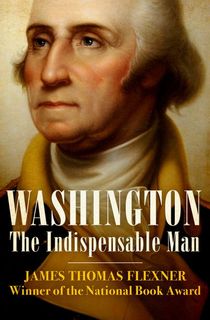
Washington
This compelling account of the nation's first president was written by a National Book award-winning author. Flexner, who won the National Book Award and a special Pulitzer for his four-volume biography of George Washington, compresses his more lengthy work into a concise and masterful single volume in this biography of our nation's first commander. Filled with dramatic details about his exploits during the Revolutionary War and the eventual rise to the presidency, Washington covers it all. This biography is accessible thanks to its shorter length but thorough in its details, and the perfect way to get to know Washington more deeply.
Related: Rediscover America’s First President with the Best George Washington Books
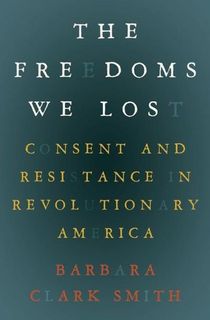
The Freedoms We Lost
This fascinating book challenges the tropes of the American Revolution to shed new light on not only what colonists won in the quest to become a country, but also what they lost. Smith argues that in order to become a nation with certain inalienable rights, colonists gave up other rights—which led to the creation of the elite class that would guide America for decades to come in their roles in the House, Senate, and Electoral College.
Early American History Books
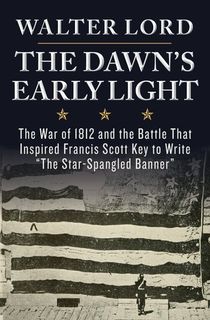
The Dawn's Early Light
Only a few decades off its feet, America found itself embroiled in another war with England in 1812. In The Dawn’s Early Light, New York Times-bestselling author Walter Lord delivers a comprehensive look at the War of 1812. Often a less-studied war, Lord's thrilling battle scenes will leave readers questioning why they've never looked into the War of 1812 before. You'll also learn about the creation of our national anthem–the poem that would become the anthem was written by Francis Scott Key as he gazed upon a naval attack upon a Baltimore fort.

Seizing Destiny
From Pulitzer Prize-winning author Richard Kluger comes a comprehensive overview of America’s expansion during the 19th century. At this point in American history, the country was starting to take shape and form its own identity outside of its former status as British colony. As America differentiated itself, its citizens began to believe in the concept of Manifest Destiny. Settlers believed that it was both their American-born right and their God-given duty to expand across the continent from sea to shining sea. In Seizing Destiny, Kluger explores the era in American history that set the course of our country for newly arrived settlers and displaced Native American populations. A clear-eyed view of how Americans took power and land regardless of former claims, this is a vital read for anyone searching to understand American exceptionalism.
Civil War and Slavery Books
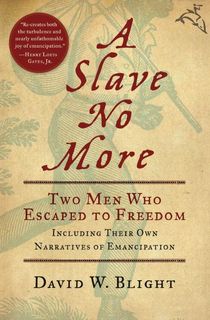
A Slave No More
A Slave No More consists of both the original narrative of two escaped former slaves and the research done by David W. Blight to illuminate those men's lives and journey. John Washington and Wallace Turnage made a harrowing escape towards the North–and freedom. Both men were fathered by white slaveholders and seized advantage of the chaos caused by the Civil War to flee their owners and join the Union Army. Blight uses information passed down from family and friends of the former slaves to paint a compelling historical image of their struggle, both before and after their escape. This moving journey is sure to resonate with Civil War enthusiasts who are seeking a powerful piece of American history.
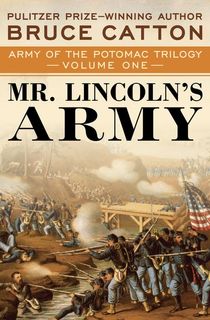
Mr. Lincoln's Army
Bruce Catton’s Pulitzer Prize-winning trilogy opens with Mr. Lincoln’s Army, a thrilling history of the first years of the Civil War. Catton shows how McClellan’s reputation until his appointment as general of the Union’s Army was a polar opposite to how he is remembered today—and how that outsized reputation led to his downfall. From soldiers on the field all the way up to the Commander-in-Chief, every player in Catton’s tale is drawn with compassion and detail.
Related: 19 Essential Civil War Books
Reconstruction History Books
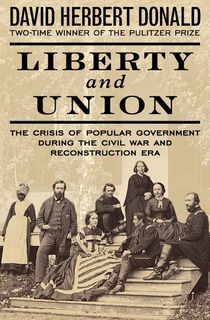
Liberty and Union
You’d be forgiven for assuming that the Civil War was the peak of contention in American history—but as David Herbert Donald clearly shows, the period of Reconstruction following the Civil War was even more chaotic. As the country expanded westward, black and African-Americans exercised their voting rights, then had those rights promptly taken away, and American citizens struggled to adjust to the reality of expanding enfranchisement, America during Reconstruction was an ever-shifting society.
Gilded Era History Books

Love, Fiercely
Discover the gold side of the Gilded Age in this charming dual biography. Edith Minturn and Isaac Newton Phelps Stoke—featured in an arresting John Singer Sargent portrait—were well-situated amongst the hoi polloi. But when they weren’t spending time with the Astors or the Vanderbilts, Edith and Isaac dedicated their lives to education, fair housing, and social reform.
Related: The True Love Story Behind an Iconic John Singer Sargent Painting
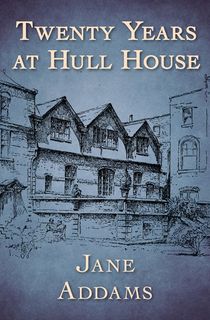
Twenty Years at Hull House
As the Gilded Age transitioned into the Progressive Era, Jane Addams took the reins with the first settlement house in America. Addams and her partner, Ellen Starr, opened their doors to immigrants, unwed mothers, the indigent elderly, and anyone else in need of food and shelter. In this memoir, Addams charts their efforts while offering an inside look at life for the less-than-wildly wealthy.
Great Depression Books
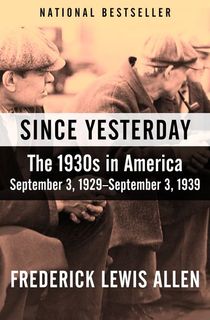
Since Yesterday
Travel back to September 3, 1929—some eight weeks before the stock market crash that changed America’s prospects for the next decade. Frederick Allen Lewis draws a clear picture of one of the most difficult eras in American history, from the despair of broken small businesses to the small pleasures of the cinema that kept spirits afloat during the coldest of days.
America in the World Wars

The Deluge
President Wilson, a believer in American neutrality and the possibility of brokering peace between the European nations, long resisted joining World War I. His reticence would finally be broken after a German U-Boat sunk the Lusitania, a passenger boat carrying some 1,198 passengers, in 1915. Although it took another two years, Wilson’s eventual declaration of war was tied back to this moment. In The Deluge, Tooze investigates how the American entrance changed the war—and the world.
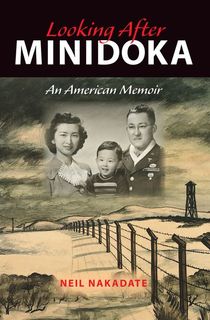
Looking After Minidoka
This often-heartbreaking, rigorously researched book sheds light on one of the most ignominious periods of American history. Author Neil Nakadate’s own family was relocated to an internment camp in Hunt, Idaho. Combining memoir, poetry, and the research skills Nakadate perfected as a professor at Iowa State University, this moving history will leave you with a greater understanding of America in its glories and its failures.
Related: 21 Essential World War II Books That Examine Every Angle of the Conflict
Civil Rights Era History Books

Parting the Waters: America in the King Years
To some, the Civil Rights era may seem a distant past. But it was far less than a lifetime ago that the work of Martin Luther King, Jr. and other black activists began the fight that continues to this day. Pulitzer Prize-winning author Taylor Branch provides a riveting account of the Civil Rights Movement alongside the rise of King. Branch closely follows King’s life, allowing readers to gain insight into his personal life and the struggles King faced as an icon for civil rights activists. Filled with interviews and perceptive thoughts from people who were close to King, Parting the Waters unveils the events that took place behind closed doors during the movement.

Answering the Call
Born in 1926, Nathaniel R. Jones has pursued a life of service. After a stint with the U.S. Army Air Corps during World War II, he received a law degree and began his work as general counsel for the NAACP, assistant general counsel for President Johnson’s Kerner Commission, and as a federal judge. Along the way, Jones fought for school desegregation, civil rights, and affirmative action. Here, he tells his own tale.
Modern American History Books

Upstairs at the White House
This New York Times bestseller is a delightfully gossipy autobiography from the sixth chief usher of the White House, J. B. West. The former White House staff member discusses what it was like to live through six presidencies. Littered with intriguing interactions with First Ladies, family members, and other politicians, Upstairs at the White House offers readers insight into daily life in the heart of our nation. Highlights from the book include a first-hand account of Jackie Kennedy’s grief following her husband’s assassination and the intelligent ideas of Eleanor Roosevelt. If you’re seeking a behind the scenes look at the White House, search no further.
Related: 10 Books About the Kennedys

Slouching Towards Bethlehem
In this collection of fascinating essays, Didion captures an era—and perfects a new genre of reporting. Whether profiling John Wayne or one of the Manson Family members, Didion’s archness and consciousness make her writing a valuable touchstone of the 1960s in America.
Related: The 11 Best Autobiographies To Change Your View of History
General American History Books
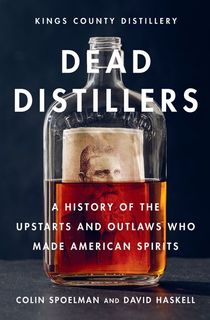
Dead Distillers
Whether the Whiskey Rebellion or Prohibition, spirits and distilleries that produce them are an important part of America’s identity. Dead Distillers explores the country’s drunken roots–including a couple presidents who were involved in the production of alcohol over the centuries. Profiling 50 distillers over the centuries, this books contains many delightful, and sometimes scandalous, vignettes about America's boozy history.
Related: 14 Little-Known Facts About America's Founding Fathers
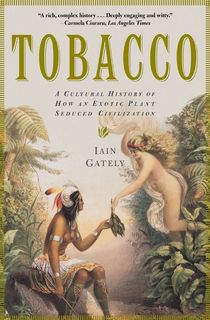
Tobacco
Long before it was the lifeblood of southern plantations, tobacco was an important aspect of culture in the lives of indigenous people. Used medicinally and religiously, tobacco became something entirely different upon the colonialization of the Americas. As tobacco went global, everything from the crop's cultivation to its purposes shifted. The focus of Gately's narrative reveals a shocking amount of insight into history in general, from the slave trade to industrialization. A key factor in the United States's continued economic dominance, this is the story of how one crop changed the world.
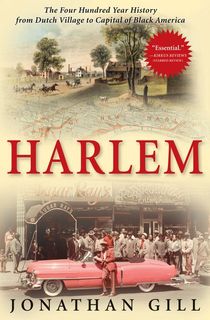
Harlem
This deeply readable study of a neighborhood synthesizes 400 years of history into less than 500 captivating pages. Starting with Henry Hudson’s exploration of the island of Manhattan and continuing into the early years of the 21st century, Gill touches on the many lives that have exemplified Harlem, whether during the Harlem Renaissance or founding of America itself.
Related: 14 Facts About Black History That You Might Not Know
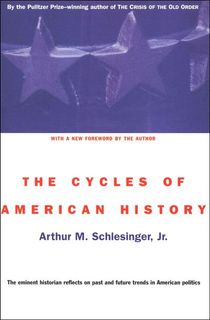
The Cycles of American History
Pulitzer Prize-winning historian Arthur M. Schlesinger, Jr. proposes a new way to look at American history—as an ever-flowing push and pull between two visions of our nation: experiment or destiny. First written in the dying days of the Cold War, Schlesinger explore how the politics of the moment not only inform current choices, but guide the future as part of a self-generating cycle.
Featured photo: Adam Smotkin / Unsplash



